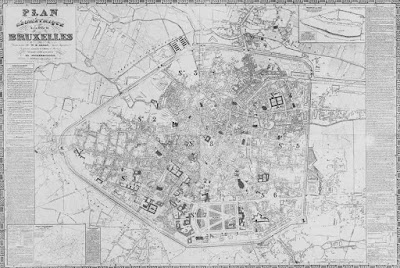As a bilingual ketje, Roel has access to historical sources in French and in Dutch, and he isn’t afraid of polemics with fellow historians.
First of all, Roel explained that Brussels wasn’t a sleepy provincial town in the 1840s but a busy capital of a very progressive and young country. He mentioned the Belgian Revolution of 1830 that overthrew the first (and authoritarian) King of the United Netherlands, William I, and saw a coalition of (progressive) liberal and (conservative) Catholic politicians take charge. So Brussels became the political capital of the young kingdom, but gradually also an economical and cultural centre.
Roel mentioned members of the Héger family (a famous doctor, friend of Nobel prize winner Jules Bordet; also a minister), but also Zoé Héger’s friend Zoé Gatti de Gammond the educator and feminist who fought for a better education for girls. There was some industry in Brussels as well: the local locomotive factory provided engines for the Belgian railways – the first passenger railway line on the European continent was opened the 5th of May 1835, between Brussels and Mechelen (Malines). There were also the big urbanisation projects in the 1860s, but even before, still under the Dutch rule, important works had been realised: the medieval city walls were torn down by Napoleon, the Brussels Warande Park (in front of the Royal Palace) was created during the XVIII century; the Botanical Garden was created by scientists during the reign of William I as well as some squares and still existing quarters.
So Brussels wasn’t the damned hellhole Charlotte Brontë or Baudelaire (or a certain president…) made of it. Was it revenge on Charlotte’s part, as Roel claimed? I myself don’t think so: In my view it was probably largely the ignorance of a Yorkshire lass visiting for the very first time, unprepared, a country with a totally different culture, language and religion.
The great thing was that Roel was able to show us pictures and maps of the city of Brussels in Charlotte’s time, so we could almost feel the city. His passion and humour made us stay awake during more than one hour. I don’t think that the fact that he spoke French was an impediment for the members.
However, when you invite Roel Jacobs, you know in advance that he is not just going to prove that Brussels was a great city, but also the greatest of all the great cities in the world. He has the kind of modesty typical of all inhabitants of capitals. For instance, I doubt if the one locomotive factory located in Brussels was better than the industrial complexes of the Liège area or the Borinage. And the Brussels port couldn’t compete with Antwerp.
And of course, Brussels wasn’t the only railway station in the country and the first project wasn’t to give Brussels a railway, but to create an international connexion between Ostend and Cologne; the Brussels-Mechelen section was just an extension.
.jpg) |
| Roel Jacobs |
There is also an ideological issue: Jacobs is clearly politically engaged himself. Nothing against that of course (although it demonstrates that all things cultural and social are highly politicised in Brussels…). But when he states that the educational system gets better when it is taken away from the Catholic Church and entrusted to the public authorities, that remains to be seen. Jacobs forgot to mention the dozens of private schools in Brussels in Charlotte’s day and the good Catholic colleges in Belgium. In this country, socialists and liberals fought two school wars against the Catholics (during the 1870s and the 1950s). Education is above all (even still today) an ideological matter in Belgium. We shouldn’t forget either that higher education in those days was a privilege of the happy few and that the proletarian masses (and the girls) weren’t concerned…
But don’t let it be said that these minute details kept me from enjoying Roels’ talk. I would say like most Belgians would: “Meer van dat!” Give us more of that!
-- Johan Hellinx


No comments:
Post a Comment